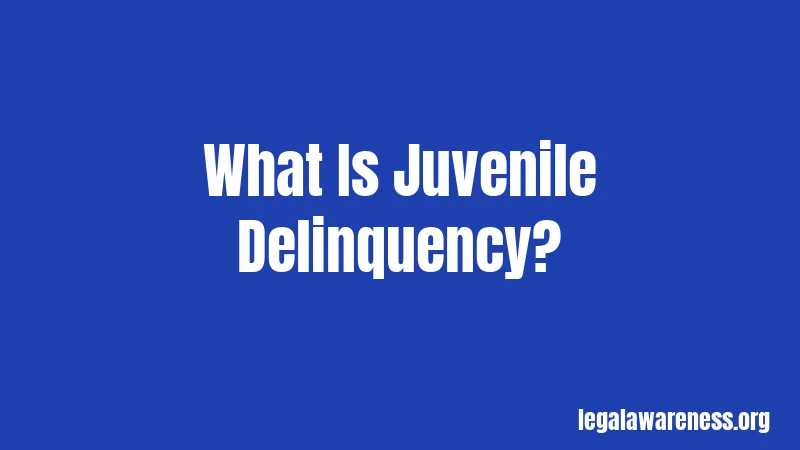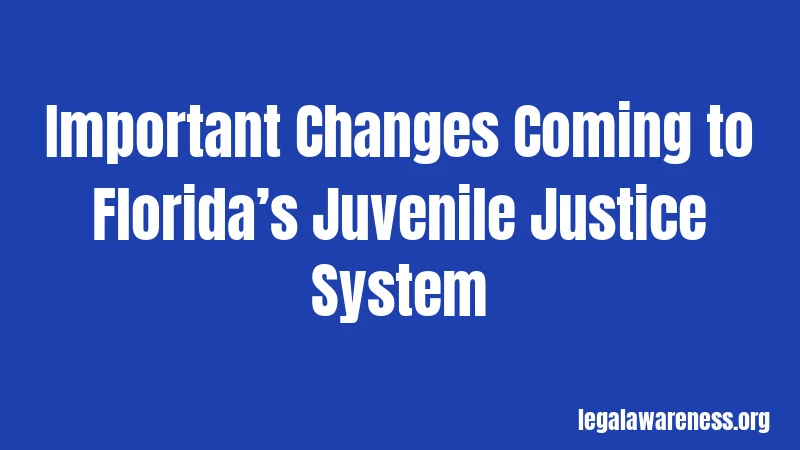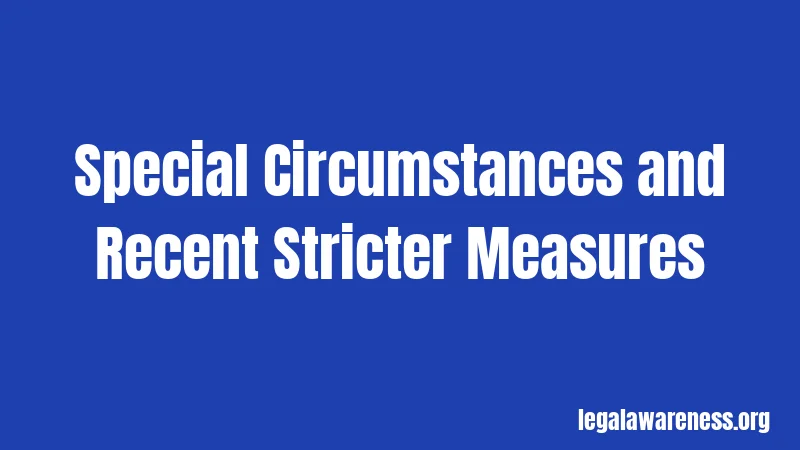Florida Juvenile Laws in 2026: Rights, Consequences, and What You Need to Know
Most people think juvenile laws are pretty basic. Turns out, they’re way more complicated than that. If you’re a teenager in Florida or the parent of one, here’s the thing: these laws can seriously impact your future. Understanding them now could save you from major headaches down the road.
The Florida juvenile justice system treats minors differently than adults. That’s actually good news. The goal is rehabilitation, not just punishment. But that doesn’t mean there aren’t real consequences. Let’s walk through exactly what these laws mean and how they might affect you.
What Is Juvenile Delinquency?

Stay with me here. In Florida, a “delinquent act” happens when someone under 18 breaks the law. That’s the official definition. What does it include? Pretty much anything criminal—from shoplifting to assault to vandalism.
Here’s what makes it different from adult charges: the court system is designed specifically for young people. You get processed through the juvenile system, not adult criminal court. That usually means lighter consequences and a focus on getting you back on track.
One thing to know: the court can treat serious felonies differently. Really serious crimes might mean you get transferred to adult court instead. We’ll get to that later.
Basic Florida Juvenile Laws
What Counts as Delinquency
Okay, this is straightforward. A delinquent act in Florida is any violation of law committed by someone under 18. That covers misdemeanors and felonies.
What’s important? The law treats different offenses differently. Shoplifting, drugs, fighting at school, theft—all delinquent acts. The severity matters when it comes to consequences.
Not sure what actually counts? Generally, anything illegal that an adult would be charged with. The only difference is who handles the case and how.
The Detention Process
So you got arrested. Probably the scariest part of the whole process. Here’s what happens next.
You’ll have a detention hearing within 24 hours. A judge decides if you stay locked up or go home. They use something called the Detention Risk Assessment Instrument (DRAI). Basically, it measures how dangerous you are and if you’ll show up for court.
The judge looks at several things: your history, if you committed a violent crime, if you’re a flight risk, and if you have ties to the community. Not trying to scare you, but this hearing matters. A lot.
There are three possible outcomes. You go home with your parents. You get released under conditions (called “supervised release”). Or you stay in secure detention until your trial.
Important Changes Coming to Florida’s Juvenile Justice System

Recent Legislative Updates (2024-2025)
Hold on, this part is important. Florida made major changes to its juvenile laws recently. Pay attention here because they affect you directly.
Starting in 2024, new rules tightened detention for certain offenses. If you’re arrested for firearm crimes or electronic monitoring violations, you go straight into secure detention. No flexibility there. The judge must keep you locked up until a hearing happens.
What else changed? The Florida Scholars Academy launched in 2024. This program gives youth in the juvenile system better educational opportunities. Full-time instruction tailored to your learning style. Honestly, this is probably the most important change. Education helps prevent re-offense.
Electronic monitoring is now allowed for probation violations. Think of it like a house arrest device. You wear it. It tracks you. Not fun, but better than detention.
Mandatory Punishments for Serious Crimes
Personally, I think this is where Florida got strict. Certain firearm offenses now carry mandatory punishments. No judge discretion. No exceptions.
If you’re charged with a gun crime, the consequences are locked in. No plea deals to get around it. The law is pretty clear about this one.
Penalties and Consequences
What Actually Happens If You’re Convicted
Wondering what real consequences look like? They vary based on what you did.
Minor violations might mean community service. Think picking up litter along the highway. You could also get probation. That’s where a probation officer checks on you regularly. Curfews, school attendance checks, random drug tests—standard stuff.
For more serious crimes, detention is on the table. This is the big one. You spend time in a juvenile detention facility. These aren’t adult prisons, but they’re not summer camp either. Think locked cells, supervised activities, education classes, and limited freedom.
The most serious option? Commitment to the Department of Juvenile Justice (DJJ). That means longer-term placement. Weeks, months, or even years depending on the offense. DJJ places you in programs designed to address your behavior, teach job skills, and provide education.
Specific Penalties for Different Offenses
Here’s where it gets real. Penalties depend on whether you committed a misdemeanor or felony.
For misdemeanors, detention is typically shorter. Days to a few weeks. Community service or probation more likely. Fines (paid by parents usually) around $500 or less.
Felonies? That’s different. You could face months or years in DJJ custody. Restitution (paying back victims). Probation extending into young adulthood. Your record doesn’t just vanish.
Sound complicated? Here’s the key: severity matters. Stealing a candy bar versus stealing a car? Totally different consequences.
Special Circumstances and Recent Stricter Measures

Transfer to Adult Court
Okay, pause. Read this carefully. This is serious business.
Florida can charge juveniles as adults. Not always—only for serious offenses. If they transfer you to adult court, you face adult penalties. That means real prison time, felony records, and consequences that follow you for life.
The law allows transfer for crimes like murder, sexual abuse, armed robbery, and repeat violent offenses. The judge decides whether you should be treated as an adult based on several factors: the crime’s seriousness, whether it was violent or premeditated, and your history with the law.
A friend asked me about this last week. Turns out many teens don’t realize how serious it is. Don’t be one of them.
Gang-Related Offenses
Criminal gang involvement changes everything. Courts must note if you’re a gang member in disposition hearings. Gang activity gets enhanced penalties.
That means harsher consequences. Judges consider gang membership when deciding sentences. It’s basically treated as an aggravating factor.
Sex Offenses and Specialized Programs
This one’s important to know. Juveniles charged with sex offenses go through special programs. The state provides intensive treatment and psychological counseling.
Sexual offender registration might apply. You might have to notify schools where you attend. It’s serious and long-lasting.
Your Rights in the Juvenile Justice System
Right to Legal Representation
You have the right to a lawyer. Non-negotiable. If your family can’t afford one, the state appoints one for free.
This matters more than you think. A good attorney knows juvenile law inside and out. They can argue for probation instead of detention. They understand how judges make decisions. Get one.
Right to Know Charges
You have the right to know exactly what you’re accused of. The charges must be explained clearly. You get to see evidence against you.
Pretty straightforward. You shouldn’t be blindsided in court.
Right to Remain Silent
You can stay quiet. You don’t have to answer police questions. You don’t have to testify. This is huge. Exercise it.
Many teens talk to police without realizing it can hurt their case. Don’t make that mistake.
How to Comply with Juvenile Probation
Understanding Probation Terms
You’re probably wondering what probation actually means. Here’s the straightforward version.
A probation officer supervises you. You report to them regularly—weekly, sometimes more. They check on you at home and at school. You follow specific rules they set.
What are typical conditions? School attendance (mandatory, seriously). Curfew (usually something like home by 8 PM). No alcohol or drugs. Community service hours. Stay away from certain people or places. Random drug tests.
Mess up on probation? You could face detention, extended probation, or DJJ commitment. Not worth it.
What Happens If You Violate Probation
Stay with me here. Violating probation has its own consequences. This isn’t minor.
Your probation officer files a violation report. You go back to court. The judge decides what happens. Options include more community service, stricter curfew, electronic monitoring, detention, or revocation (ending probation and committing you to DJJ).
Here’s where it gets interesting: violating probation is actually easier than you think. Missing a meeting with your PO. Being late to curfew by 30 minutes. Getting caught with just having a friend the judge said to avoid. All violations.
Community Service Requirements
Community service sounds light until you’re actually doing it. You work for free in the community—usually at nonprofits, parks, or public facilities.
Hours vary. Could be 40 hours. Could be 200. Depends on your offense and the judge’s mood. You show up when scheduled or face consequences. No excuses accepted.
Special Circumstances: When Confidentiality Is Lost
Public Records for Felony Charges
Here’s something most teens don’t realize. Your case isn’t automatically private.
For felony charges, your name and photo can become public. The arrest report is available. This happens even for juveniles. The information isn’t confidential.
That means future employers, colleges, and basically anyone can find out about your arrest. It’s not a secret. Your Facebook friends might see it.
School Notification Requirements
Schools get notified when a student gets arrested for a felony. Teachers won’t announce it to the class, but administrators know.
This affects school discipline. You might get suspended or expelled. That’s separate from juvenile court consequences.
How to Take Action If Your Child Is Arrested
The First 24 Hours Matter
You got the call. Your kid’s been arrested. Now what?
First, find out where they’re being held. Detention facilities are throughout Florida. Call DJJ or the police department. They’ll tell you which facility.
Second, get a lawyer immediately. Contact your county public defender’s office if you can’t afford private counsel. Time matters here.
Third, don’t let your child talk to police without an attorney present. This is non-negotiable. Police often say talking will help. It won’t. It’ll hurt.
Preparing for the Detention Hearing
The detention hearing happens within 24 hours. This determines if your child stays locked up or comes home.
Prepare evidence showing your child isn’t dangerous. Character letters from teachers, employers, or community members. Evidence of ties to the community. Medical records if relevant. Employment history if old enough.
You want to show the judge your kid will show up for court and won’t commit more crimes. Present a compelling case for release.
Frequently Asked Questions
What’s the difference between delinquency and dependency? Delinquency means a youth broke the law. Dependency means a child is abused, neglected, or not cared for properly. These are different court processes with different outcomes.
Can a juvenile record be sealed? Yes, but you must request it. After the case concludes, you can petition the court to seal the records. This hides them from most employers and schools. It’s not automatic, though.
Will my child go to prison? Probably not. Juveniles rarely go to adult prisons. They go to DJJ facilities designed for youth. These aren’t prisons. They’re more like secure schools with locked doors.
What if my child is accused of something they didn’t do? Hire a lawyer immediately. Your child has the right to defend themselves. Police accusations aren’t proof. The state must prove guilt beyond reasonable doubt.
How long do juvenile records stay? They can be sealed at your request after the case ends. If sealed, they’re hidden from view. Some records stay with DJJ longer, but the general public won’t see them.
Final Thoughts
Here’s what you actually need to remember. Florida takes juvenile delinquency seriously, but the system is designed to help young people, not destroy them. The focus is rehabilitation.
That said, consequences are real. Detention is real. Probation restrictions are real. Transfer to adult court happens.
Your best move? Stay informed. Know the laws. Know your rights. If something goes wrong, get a lawyer immediately. And honestly, try to stay out of trouble in the first place. It’s way easier than dealing with any of this.
Now you know the basics. Stay safe, stay smart, and when in doubt, ask a lawyer.
References
- Florida Department of Juvenile Justice Official Website — Comprehensive information about DJJ programs, facilities, and the juvenile justice process
- Florida Statutes Chapter 985 — Juvenile Justice — Official state law covering all aspects of Florida’s juvenile justice system
- Florida Rules of Juvenile Procedure — Court procedures and rules for juvenile cases (updated September 2024)
- Florida Scholars Academy Information — Educational opportunities for youth in the DJJ system, launched 2024
- Florida Courts Delinquency Benchbook — Judicial reference guide for delinquency cases
- Florida Public Defender Association — Free legal representation information for qualifying families
